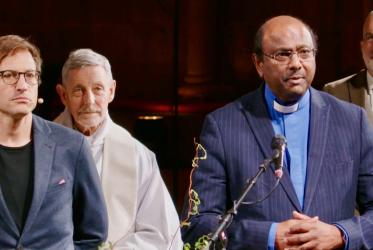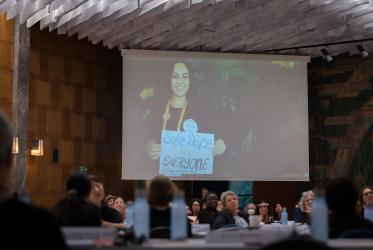Gathering a diverse representation from migrant communities in Geneva, affirming expressions of solidarity and promoting social justice for “people on the move”, a public event marked Jeûne genevois (Geneva’s traditional Thursday observation of fasting and prayer). The annual civic holiday was celebrated on 11 September at the Ecumenical Centre, Geneva, Switzerland.
Sponsored by Témoigner Ensemble à Genève (Witnessing Together in Geneva, a programme of the John Knox International Reformed Centre), the Protestant Church of Geneva, the Parish of St Gervais Pâquis and the World Council of Churches (WCC), the “Jeûne genevois international” aims to revive historic traditions of Geneva in support of migrants in their new homes.
Dr Anne Kubai, assistant professor and researcher for religion, conflict and migrant studies at the University of Uppsala, spoke about experiences of migrants and churches’ role in supporting them. While migration is part of the changing social and ecclesial landscape of many countries in Europe, Kubai said, “Through religious affiliations, immigrants are actively redefining themselves and creating distinct identities.”
She highlighted the role of religion in serving as a “resource for interpreting reality for both the individual and the society and shaping social relations”.
Amidst multi-religious societies and communities, Kubai said that churches provide social and spiritual spaces for both segregation and integration of immigrants. “Identity of communities is often built around the churches where they speak their native languages and recreate their customs and traditions,” she said
Edouard Dommen, an academic and researcher from the organization Shareholders for Sustainable Economy, also addressed the event. Dommen brought to light a history of large parts of the Swiss population fleeing poverty in their homeland through mercenary service to the armies in neighbouring regions and settlements in colonies overseas. Dommen shared statistics on how environmental, economic and political factors have caused people cross borders throughout history, and showed that this still remains a trend. Sabine Petermann moderated discussions in the morning session at the event.
From the WCC, Dr Clare Amos and Dr Amélé Ekué highlighted the theme through Bible studies on Hagar and the Good Samaritan.
Jooseop Keum, secretary of the WCC Commission on World Mission and Evangelism (CWME), which supported the event, extended greetings to the participants. Keum paid a special tribute to Rev. Dr Roswitha Golder, coordinator of the event along with Pastor Joseph Kabongo. “The contributions Rev. Roswitha Golder has made to the work of Witnessing Together in Geneva are immense. Her tireless efforts have provided local churches opportunities to promote diversity in congregations, as well as in communities they serve. We would like to express our heart-felt gratitude for these efforts,” said Keum.
The event culminated in a march from the Ecumenical Centre to the St Gervais Church, where a worship service was held featuring Eritrean and Cameroonian choirs. Preachers were Rev. Sonja Musy from the Protestant Church in Geneva and Rev. Dr Peniel Rajkumar of the WCC who shared reflections on 1 Kings 17:7-16.
Jeûne genevois, a public holiday in Geneva, commemorates the fasting of Geneva citizens in the 16th century, often to express solidarity with Protestants persecuted in France and as a protest against the massacre of French Huguenots.
Witnessing Together in Geneva (in French)





